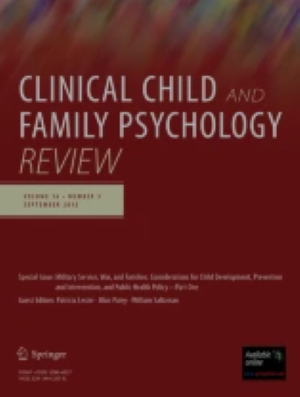早期关系健康及其对大脑发育的影响:范围综述。
IF 6.1
1区 心理学
Q1 PSYCHOLOGY, CLINICAL
引用次数: 0
摘要
在生命早期形成安全的亲子关系,这里称为早期关系健康,在健康发展中起着核心作用。然而,关于早期关系健康如何“深入皮肤”影响发育中的大脑的证据尚不清楚。在此,我们对现有文献进行了综述,并综合了从怀孕到三岁的关系健康与随后的大脑结构、功能和连通性之间的联系的证据。在MEDLINE、PsycINFO和Embase数据库中进行文献检索,得到7156项研究。在Living Knowledge System(一种人工智能辅助筛选工具)上对研究进行筛选,结果有79项研究被纳入本综述。结果是根据相关健康检查的类型、成像方式的类型(如脑电图、结构和功能磁共振成像)和发育阶段综合得出的。我们确定了早期关系健康与大脑结构、功能和连通性之间关系的研究,这些研究跨越了童年到青年期,没有超过这个年龄段的研究。有证据表明,早期的人际关系健康与大脑激活模式有关,这种模式可能反映出更积极的情绪体验,并降低患精神病理的风险。然而,很少有研究考察大脑结构、功能和连通性的纵向变化。甚至很少有人研究过母子关系之外的关系健康。未来的研究需要提高对关系健康对大脑发育影响的理解,并确定这种影响是否反映了一种将关系健康与整个生命周期的健康和幸福联系起来的机制。本文章由计算机程序翻译,如有差异,请以英文原文为准。
Early Relational Health and its Impact on the Developing Brain: A Scoping Review.
The formation of secure parent-child bonds in early life, hereto referred to as early relational health, plays a central role in healthy development. However, the evidence on how early relational health 'gets under the skin' to impact the developing brain remains unclear. Here, we provide a scoping review of the extant literature and synthesize evidence on the link between relational health from conception to age three and subsequent brain structure, function, and connectivity. Literature searches in MEDLINE, PsycINFO, and Embase databases yielded 7156 studies. Screening of studies was conducted on the Living Knowledge System (an AI-assisted screening tool), which resulted in 79 studies being included in the review. Results were synthesized based on the type of relational health examined, type of imaging modality (e.g., electroencephalogram, structural, and functional magnetic resonance imaging), and developmental stage. We identified studies of the relationship between early relational health and brain structure, function, and connectivity that spanned from childhood to young adulthood, with no research beyond this age period. There was evidence for early relational health to be associated with patterns of brain activation that may reflect the experience of more positive emotions and reduced risk for psychopathology. However, few studies examined longitudinal changes in brain structure, function, and connectivity. Even fewer have examined relational health beyond the mother-infant bond. Future research is needed to improve understanding of the impact of relational health on brain development and to ascertain whether such impacts reflect a mechanism linking relational health with health and wellbeing across the lifespan.
求助全文
通过发布文献求助,成功后即可免费获取论文全文。
去求助
来源期刊

Clinical Child and Family Psychology Review
PSYCHOLOGY, CLINICAL-
CiteScore
10.50
自引率
4.30%
发文量
45
期刊介绍:
Editors-in-Chief: Dr. Ronald J. Prinz, University of South Carolina and Dr. Thomas H. Ollendick, Virginia Polytechnic Institute Clinical Child and Family Psychology Review is a quarterly, peer-reviewed journal that provides an international, interdisciplinary forum in which important and new developments in this field are identified and in-depth reviews on current thought and practices are published. The Journal publishes original research reviews, conceptual and theoretical papers, and related work in the broad area of the behavioral sciences that pertains to infants, children, adolescents, and families. Contributions originate from a wide array of disciplines including, but not limited to, psychology (e.g., clinical, community, developmental, family, school), medicine (e.g., family practice, pediatrics, psychiatry), public health, social work, and education. Topical content includes science and application and covers facets of etiology, assessment, description, treatment and intervention, prevention, methodology, and public policy. Submissions are by invitation only and undergo peer review. The Editors, in consultation with the Editorial Board, invite highly qualified experts to contribute original papers on topics of timely interest and significance.
 求助内容:
求助内容: 应助结果提醒方式:
应助结果提醒方式:


